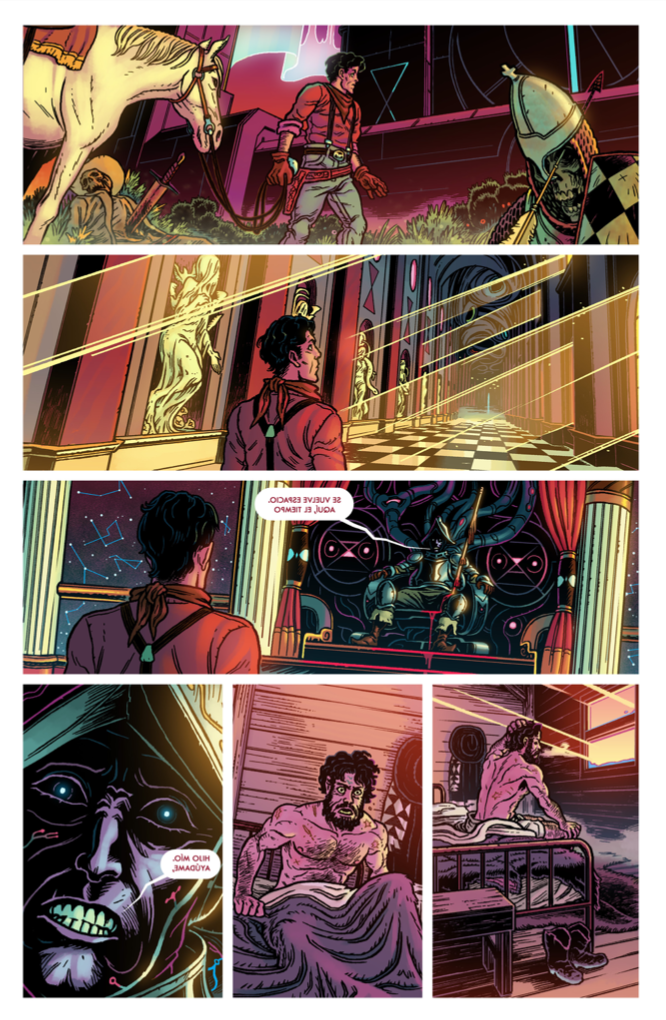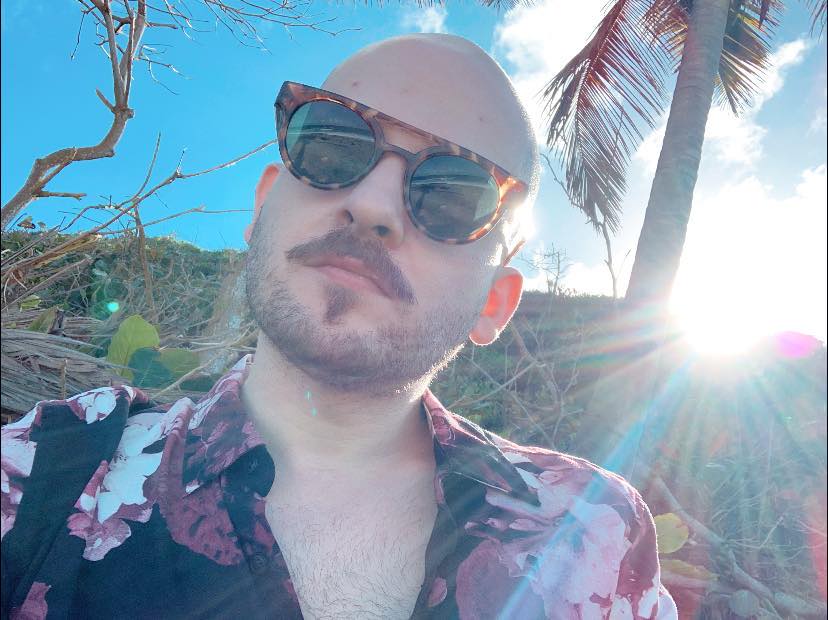
Daniel Irizarri is a cartoonist based in Puerto Rico. His professional portfolio is that of a freelancer on the grind. It consists of licensed properties such as Star Trek and Judge Dredd, freelance work on creator-owned titles like Holy West (with Seth Jacob) and Cloudia & Rex (with Erick Freitas and Ulises Fariñas), self-published art books (Otherworldy), and private commissions. Irizarri has worked on comics, in various forms, since the late '00s. True to his age, his style and sensibility belie his place on the cusp of creative generations. He cut his teeth in DeviantArt and Tumblr circles, but comics and cartoons of the '80s and '90s also figure into his influences, as does anime from the early Toonami days. While many peers in his generation seem to opt for either sparse minimalism or detail-heavy maximalism in their work, Irizarri threads the needle between the two, producing a distinctive, but wholly accessible result. He is also known for his co-hosting duties on the Mex Flentallo podcast with artist Ramon Villalobos. On the podcast, the duo conduct refreshingly candid interviews with professional peers. It has been on hiatus since early 2022, but may not be over altogether. I interviewed Irizarri in late September and early October by email.
-Ian Thomas
* * *
IAN THOMAS: How are you doing? I’ve been following your posts on Twitter, where you’ve been posting about your experience following Hurricane Fiona.
DANIEL IRIZARRI: I try not to fall into the trap of comparing miseries but, even when it was a harsh couple weeks without power, I'm very aware that my partner and I were much more fortunate than a lot of folks in the central mountain, south and west of the island, who still don't have power, who've lost their homes, I've read reports of people leaving their gas-powered generators on a little too close to their windows dying from the CO 2 fumes.
A lot of my posting has been an effort to keep an awareness of the situation going. I may be okay, I may have been lucky enough that my partner had a cistern set up, but so many others haven't been able to afford that. Coming back around though, that doesn't mean that it also hasn't sucked for us.
When was power restored? What has the day-to-day been like?
Power is being restored sporadically from the places of most political convenience on down. Our electrical grid was already in shambles due to austerity, but after it was privatized and sold by our government to a Canadian company by the name of LUMA, it's also being administered into the ground.
As of Thursday, September 29th though, we seem to have gotten power re-established where we live. There're still many other municipalities that are waiting to be reenergized though.
How has the hurricane affected your work schedule and your productivity?
Running around, making sure we have enough gas to run a generator, doing dishes with jugs of water, there's lots of little things that eat away at my productive time, especially when I do the majority of work digitally. This isn't even accounting the lack of morale left when you go more than a week without power.
I imagine that a big part of life in Puerto Rico is lived in consideration of weather threats. Can you talk about that?
Every year, hurricane season around August through to October is an inevitable game of Russian roulette with the Atlantic. After a while everyone here becomes an amateur meteorologist, guesstimating trajectories, so if you're smart and you have the money, you stock up. The week before the hurricane everyone's out buying up the gas and water, which creates an additional stress to these things, but it's just what people instinctually do in these scenarios.
Is there a way you generally prepare for hurricane season?
There's ideal prep, and then there's the prep you can do at our income level. We already have to assume that the power will go out for multiple days, so we get external battery chargers, charge all our devices. We lucked out that my partner's father was going on a trip and he brought over his gas-powered generator, but if it weren't for that, I don't know what we would have done.
Seeing coverage of Hurricane Ian, do you think the American media covers events differently when they occur in Puerto Rico?
It's hard to gauge, really. I was horrified seeing all the footage coming out of Florida, but I don't know how it felt to Americans. In PR we go into full hurricane-mode, but outside of the immediately affected regions, it felt like everyone else just went about their media discourses.
How long have you lived in Puerto Rico?
I was born down here, in Ponce (where Biden was just visiting for a couple of hours for some photo ops). Then, when I was five, my dad took a job opportunity as a doctor in a reservation in South Dakota. It was a radical shift, only to be brought back to the island four years later in 1998, and I've lived here ever since.
Can you talk a little about when you came to comics? What crossed your radar first and to what kind of stuff did you find yourself drawn? What kind of stuff was most readily available to you?
It's hard to pinpoint. I'm the youngest of four and my eldest brother, ever since I could remember, was the artist of the family. He was big into '80s cartoons (Transformers, Masters of the Universe, Teenage Mutant Ninja Turtles), comics, and video games like Street Fighter, so I was born into an environment surrounded by that stuff thanks to him. I think my first comic exposure might have been reading the crazy adventures he would draw on his notebooks.
By the time I was in South Dakota, he was in college in Minnesota and all of the '90s nerdy stuff would just trickle down as well, flipping through his issues of Wizard, he was collecting comics during the “Age of Apocalypse” and the “Onslaught" era, so I was like six or seven, just hypnotized by Joe Madureira's work on those books.
After we moved back down to PR, it was stuff like Dragon Ball Z, playing in the local Telemundo channel after school. It was a LOT of anime after that, which eventually led me down a Shonen Jump rabbit hole. It was very eye-opening, seeing DBZ in its original manga form, but also this was my first contact with Naruto, Shaman King, Bleach and stuff like Eyeshield 21.
By the time I got to college I was finally near a Borders store and I got back into American comics, with stuff like Hellboy, The Walking Dead and a lot of Bendis Marvel stuff—it's what the Wizard magazines said was good! Then Grant Morrison and Frank Quitely really opened up my third eye to what was possible with comics, and around 2011 I discovered Moebius and it was like hitting a factory reset on my creativity. It really shook off the death grip superheroes had on me.
So would you say your proper entry into American stuff was by way of trade paperbacks? If so, do you think reading stuff in terms of arcs, rather than issues, affected the way you tell stories?
Possibly for a bit, but I was also drawn to the self-contained narratives from things like Hellboy and Mignola's other short stories like in the Screw-On Head collection. I became a big Star Trek fan in college and its episodic narrative was very inspiring as well. They each serve a purpose, as long as the story isn't bloated.
What was the first Moebius stuff you read? Can you talk specifically about what seeing his stuff changed for you?
It might have been a professor lending me his copy of L'Incal with Jodorowsky. I was taking French so there was some of it I could understand, but I was mostly taking in the artwork.
Afterwards it was a lot of online hunting down works, a lot of his single illustrations out on the desert, his color palette in those worlds practically reformatted my art.
Did your older brother end up pursuing art as a career?
He does, at his own pace. He focused on raising a family but he takes time to publish smaller comics of his own in zines and ashcans that he sells in comic cons where he lives in the US, but I don't think his work is targeting current mainstream comics culture or discourse.
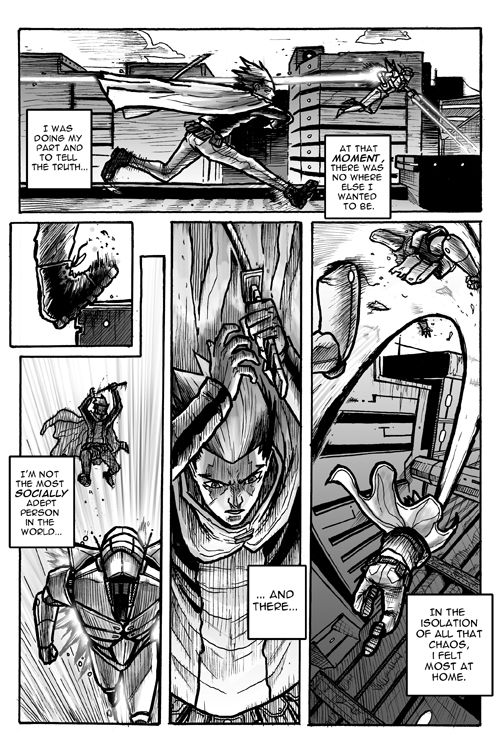
When did you first start drawing? What was your path into the industry?
I was pretty much drawing throughout all that time. When I was three or four, I was drawing what I could imitate of my brother's art. then I was doing fan art of Madureira's crazy feral Wolverine.
I think my first comics were around 5th or 6th grade, but I was really serializing my work already by 7th grade with longform stories in notebooks, more and more influenced by the Toonami anime I was watching.
I was publishing my own work early on in college, printing issues of my series Mecha-Reign and selling them around campus, I took copies of those with me and made a couple trips to NYCC around 2008, which caught the eye of a couple good artists who'd give me encouraging words. By around 2010-ish I got my first paid work for a local PR company called RazorBlade Apple.
Throughout all of this I had been posting my work online, becoming friends with contemporaries in DeviantArt and then Tumblr, where my work was starting to get some traction and followings from young writers who'd want art for their pitch; and from then to around 2014 a lot of my paid work was that kind of thing to varying degrees of success.
That's when I first started collaborating with writer Seth Jacob on a variety of concepts he wanted to get out there which would eventually lead to Holy West. Around 2013, writer Jakob Free (of Cities of Magick) hired me to do a full issue of his series, "This City, This Fire", and that felt like a big step in me considering myself a professional comic book artist.
Where on campus would you sell Mecha-Reign? What was the concept and how would you pitch it to buyers? What did you learn from those initial printing endeavors?
Literally anywhere I could. I'd ask different art professors for permission to make five-minute sales pitches to class and I think they let me because they were just excited to see a student applying themselves like that.
I still like the concept of the book itself, but it's dystopian future-stuff. Earth is completely industrialized by mechanical beings and our heroes are humanity's last hope, it's heavily informed by Terminator and The Matrix but with a big dose of anime influences, plenty immature but there's a gem there if I ever get the chance to revisit it.
As for printing, I learned to check a print proof before printing the rest! One time with the second book I may have sent the printer the folder with all the files that were resized for posting online and they handed back 150 useless pixelated books.
It seems like the generation of artists that were active in the DeviantArt and Tumblr scenes constitute a community unto themselves. Beyond networking, did posting your work facilitate growth? Are you still in touch with anyone from those circles?
Oh, yes. Some of my closest friends are from those days when everyone was just hustling and hungry for it, trying to get better. People who've gone on to work in the industry at various levels, they checked in on me after the hurricane.
Networking was part of it, but that quid pro quo aspect was always a little ugly for me, so really I was just trying to find the people who inspired me and genuinely thank them for doing the work they did, and keep learning from them.
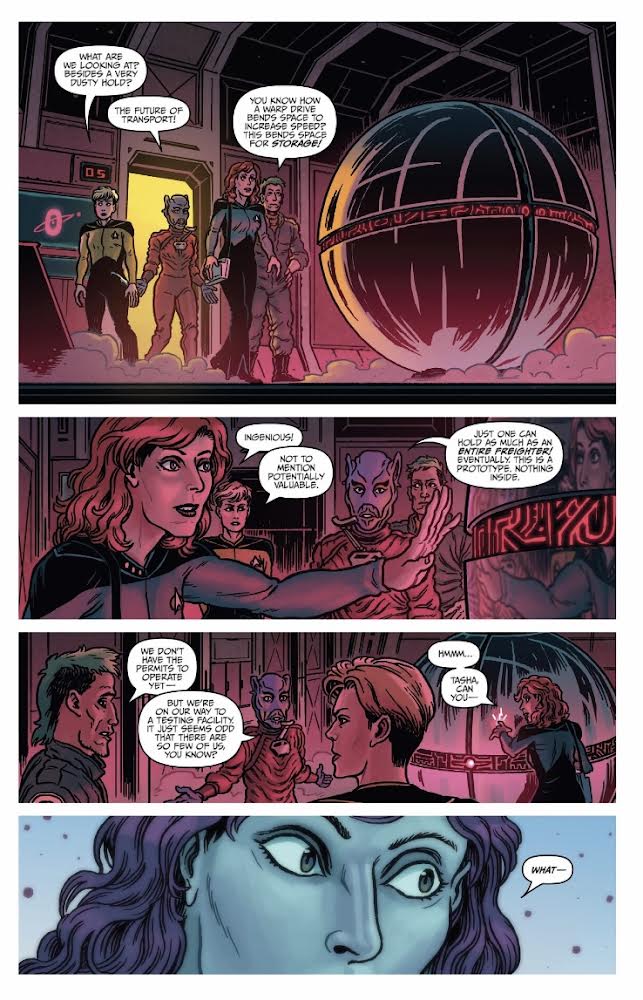
What role does commission work play in your artistic life? Are they a big part of your income? Is the commission side of things much different than pursuing traditionally published work?
Commissions are a necessity to get by between projects or when I'm in tight spots economically. A lot of artists make commissions into their whole career, but it's something that works best with a more popular aesthetic than what I see my work as [having]. It's the problem of wanting to be an 'artist's artist' where the people who like my work are usually broke artists themselves, hahahaha.
So, it's a love/hate thing. It also depends on how well the economy is doing. 2020, when people had that pandemic money, it was nice.
Are there factors that make for a particularly good (or bad) commission transaction in your experience?
Yeah, as long as it's a character I know or enjoy, I'll probably make it work. Sometimes I shoot myself in the foot with what I choose to do for backgrounds, but that's on me.
Really though, I'd just prefer steady work to commissions unless you're cool and pay me a lot of money.
Do you have formal training? Self-taught?
I graduated with a BA in Plastic Arts, which is like a certificate of "formal training", and a lot of my color theory and art literacy comes from that, but, in terms of the School of Comics, it was the classic How to Draw Comics the Marvel Way start. My brother had a copy of that that I could go through obsessively, learning shapes and forms.
Afterwards it was just following and studying the artists I loved. Toriyama, Kishimoto, Tite [Kubo], Miura, Finch, McNiven, Cassaday, Mignola, Quitely, Moebius; but also learning, competing and growing with the contemporaries around me.

In your experience, what do people misunderstand about making comics for the US market from Puerto Rico?
I think people misunderstand that there's Puerto Ricans in the states, second generation, who will market themselves fully in the flag but who have full access to the convention circuit and other US connections; and separate from that are the people who live on the island, who don't have that same opportunity to network in person with people who might be into our work.
It feels like everyone is more and more isolated these days, so maybe it's become a more generalized sentiment, but I end up feeling like I'm not a part of the local scene, nor am I part of the US comics scene.
That sounds lonely. Do you feel like you are part of a cohort of folks who are in a similar situation?
After the pandemic I think most people are, but I think we've gravitated towards smaller communities within social media where we can have a sense of friendship and camaraderie.
As of this writing, October 3, President Biden is slated to visit Puerto Rico and is expected to extend around $60M in aid. That this falls short of what is needed notwithstanding, what do you think politicians in the US misunderstand about Puerto Rico?
First, that any money given to the current PNP [Partido Nuevo Progresista, or "New Progressive Party"] administration will never go towards helping actual Puerto Ricans. The closest thing we've ever had to actual aid has been the deposits from the pandemic. Some people have gotten money from FEMA, which is nice, but counting on this administration to use funds given to them to benefit anyone but themselves is delusional. It is a 100% corrupt administration and political party.
Second, that Statehood is not a mercy or some kind of noble gift Democrats can 'bestow' on Puerto Ricans. Part of it is a misunderstanding that if PR became a state, it would be some kind of liberal bastion of progressive politics, just because the Puerto Ricans in the states are mostly Democrats. If they ever did give PR statehood, they would essentially be getting Florida part two.
Is independence and autonomy for PR what you envision as the most beneficial path forward?
To me it is, but it comes with a lot of caveats. It's a harder road, but the one we're currently on is choking us. It's frustrating because politics is such a taboo that even the people who're being most hurt by US policy will say things like "I don't care about politics I just want the corruption to stop" and can't see how those things are intertwined.
It's the uphill battle of convincing people to vote for their own interests instead of what they're told is the easiest path.
Can you talk a little bit about what or who has influenced your politics?
Every Puerto Rican at some point or another is made aware that they're second-class citizens, but, depending on your status, where you grow up, you'll come to different conclusions about what should happen to that citizenship.
It's been a compounded phenomenon; my grandmother instilled in us a deep personal pride to being Puerto Rican. Living in the states for a few years and being made to "pledge allegiance" did not jive with that.
I remember very vividly seeing on the news that the FBI had raided PR Nationalist leader Filiberto Ojeda Ríos' home and executed him. It was a very stark and brutal reminder of the boot on all our necks.
These things are hard to pinpoint. There's a similar quantity of Puerto Ricans who see all this oppression and just want the chance to be the boot on someone else's neck, so it's hard to say why I ended up thinking how I do.

On Twitter, you were expressing some regrets, following your experience at IDW on Judge Dredd. Can you talk about how geography and collaborations have affected you?
I made that post on the five-year anniversary of Hurricane Maria, with no power due to Hurricane Fiona, and I let myself be a little more open than usual on the timeline.
I made a lot of assumptions by the time Judge Dredd was coming to a close, I thought I had 'made it in' to the industry. I had already published Cloudia & Rex with the writers on that book and Ulises Fariñas had practically guaranteed another series lined up, and at the time they were literally my only direct connection to the industry.
I wasn't counting on them having their projects cancelled and I don't know what conversations were had about this at a company level, so why I didn't hear back from the people at IDW at the time is purely speculation. That meant money got tight, and, to his credit, Ulises did get me smaller gigs, doing odd job illustrations for video games, and some digital comics, that kept me afloat between other illustration work.
Afterwards, I did get some work from them that I really enjoyed doing. A short story for The Spider-King: Frostbite one-shot and a short story for a Star Trek one-shot. I keep in touch with editors from that time, so who knows?
Every artist arrives by a different path, but what industry conditions do you think are unique to your generation of artists?
I feel we're in an unavoidable age of Twitter-metrics. Where if you don't have a cultivated audience, it's a lot harder to network. So, it feels more and more like the quality of a product takes a back seat to who's bestie you are, and who we see more of in up-and-coming spaces are the people who're better at that game.

You’re currently working on Holy West. How has that differed from your previous work experience?
I'm working with Seth Jacob on that, I've worked with him on a lot of stuff since around 2013. He's always considered me for his new concepts, so I've worked on a few of his pitches since then. Holy West was another project like that, but once the pandemic hit, we made the decision to stop trying to shop it around and go to the people with a Kickstarter.
It's a bit of a bumpy road but that's part of the Kickstarter self-publishing path. I think it's differed most in that Seth let me take my time with the pages in a way that's not often allowed in the constraints of monthly releases, and that has led to a book that, ideally, people will look at [at] least more than once [before] calling it a day. I'm really excited that soon we'll be releasing it for purchase to the public outside of Kickstarter, so be on the lookout for that!
You have done a lot of work in the genre space. Is genre stuff uniquely appealing to you? Are there other avenues you’d like to explore?
Most of my interests are in sci-fi. There's beautiful slice-of-life realism that I appreciate, but things get so real day-to-day over here that science fiction becomes therapeutic.
If money weren't an issue, I would be doing sci-fi paintings and comics 'til my last breath, but as long as I can publish a volume of my Otherworldly artbooks every 4-5 years I'll be okay.
How do you go about building out your art books? Do you approach the content in the same way you do comics?
It's very loose. I like to look at the collection of my digital paintings together and start to find recurring themes or genres and then form a loose narrative out of the worlds in the paintings.
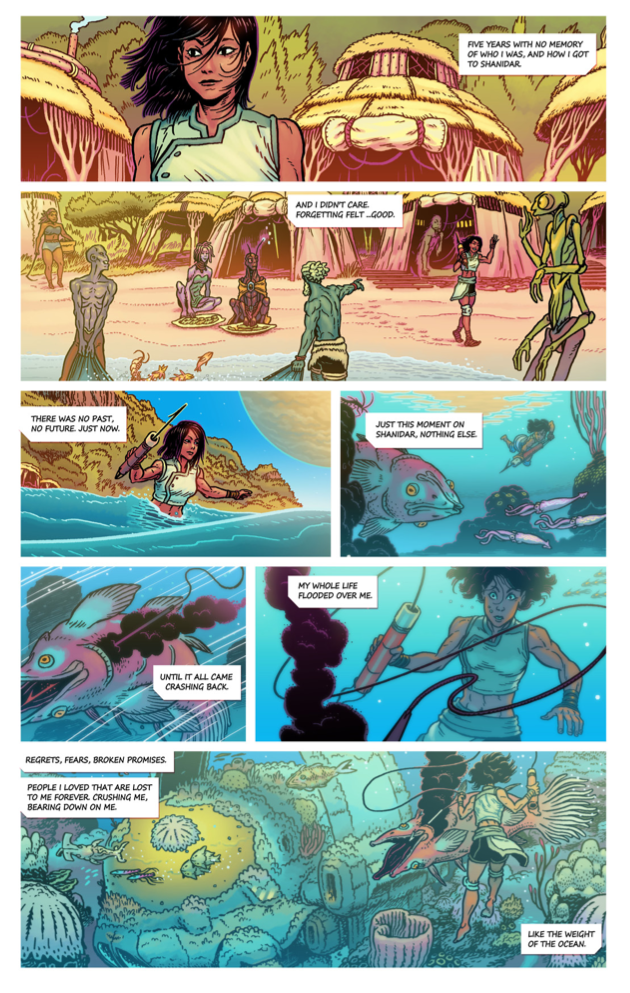
Can you talk a little bit about what you’re looking at/ listening to as you draw Holy West? I feel like I detect some Jodorowsky along with Spaghetti Western influences?
I'm literally watching stuff nonstop. The only way I can focus on work is if I have a season of something streaming. Holy West, though, got me to finally watch Deadwood. A masterpiece of period fiction. I've watched some of the Sergio Leone movies, Mask of Zorro; Ken Burns' The West documentary series was essential viewing, to me.
I try to have references but also avoid a lot of material in the same genre to avoid inspirational contamination and see what my mind can do on its own.
You describe yourself as "ANTI-NFT" in your Twitter bio. Given the downturn in NFTs and crypto in recent months, do you think those markets are here to stay in some form? How do you think they affect you as a working artist?
It was a more important label in 2021, to take a stand on this sort of thing, but it's been nice to see the failure of those markets and feel vindicated about the fact that it was always going to be a scam that additionally destroys the climate.
I don't think it'll affect my work aside from having to turn down one or two gigs from people with .eth on their Twitter handles, but it's for the best 'cause those people tend to be scammers, and either way all those NFT promoters are all moving on to AI art now and that's its own can of worms; that feels like looking at my own death happening 100 meters away.
How so?
Maybe it's not there yet, maybe it'll be five years, but those programmers have only one intention with designing these art generators, and it's to make us (artists) obsolete. It's a demonic project altogether.
Just this weekend one of these ghouls announced that they'd fed their program loads of Kim Jung Gi work (RIP) and that they "anyone can have an original KJG now," and it brought out of me a real desire for violence towards everyone involved.
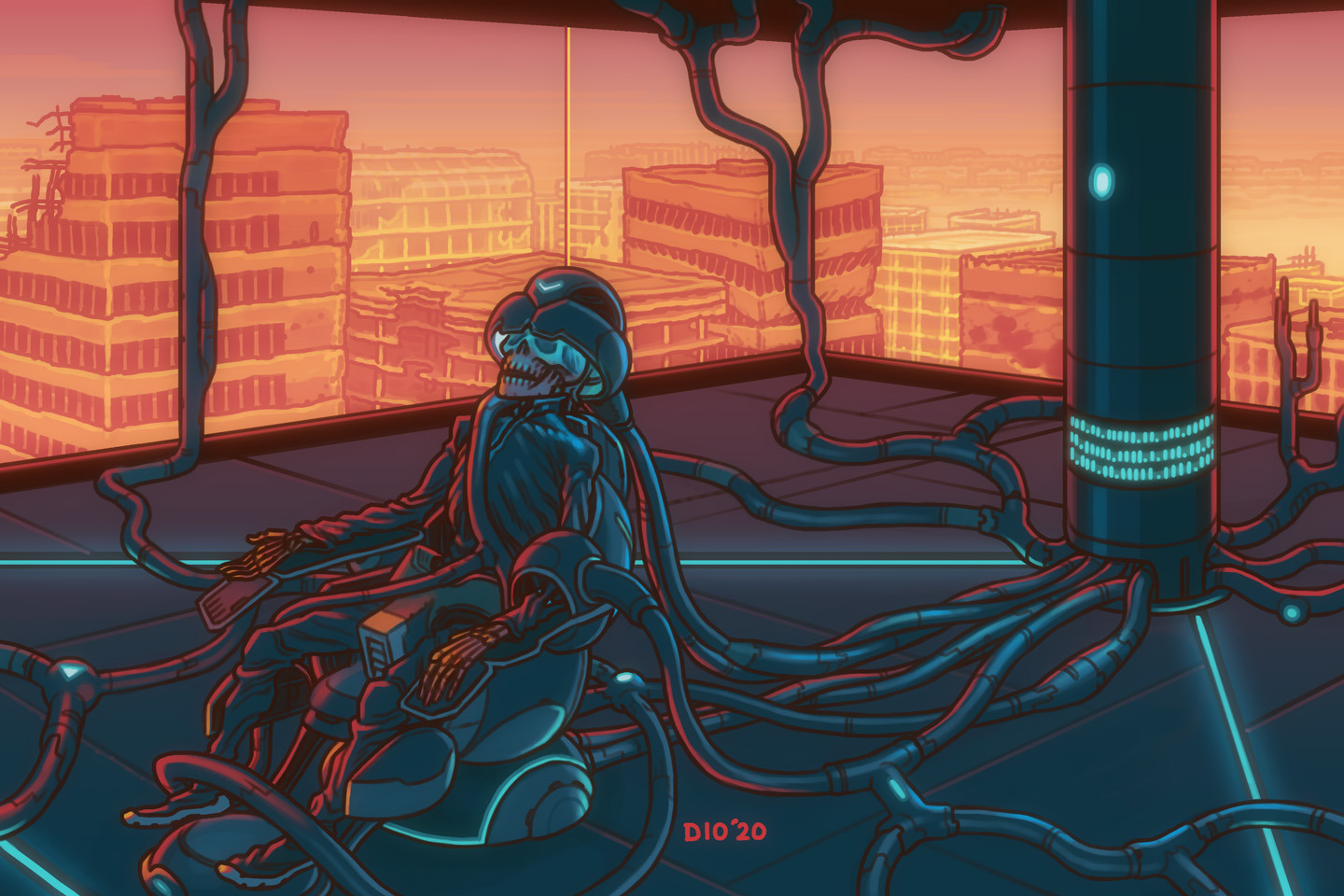
Is Mex Flentallo, your podcast with Ramon Villalobos, on indefinite hiatus? What did you/do you like about the medium of podcasting?
I love podcasting with Ramon, but we're the two worst people to do it. It's the curse of drawing comics (and being slower artists) where it takes up ALL of our time, and that leaves very little time to record, and much less for Ramon to edit.
We just talked about recording a sort of 'check in' episode to keep people posted, and we still really enjoy doing it, so there's always a chance that more episodes could happen if we both have a break in our schedules. Shout out to the MF-ers who hold our feet to the flame about it on Twitter though. I'm always surprised at the love from the listeners for the episodes we've uploaded.




